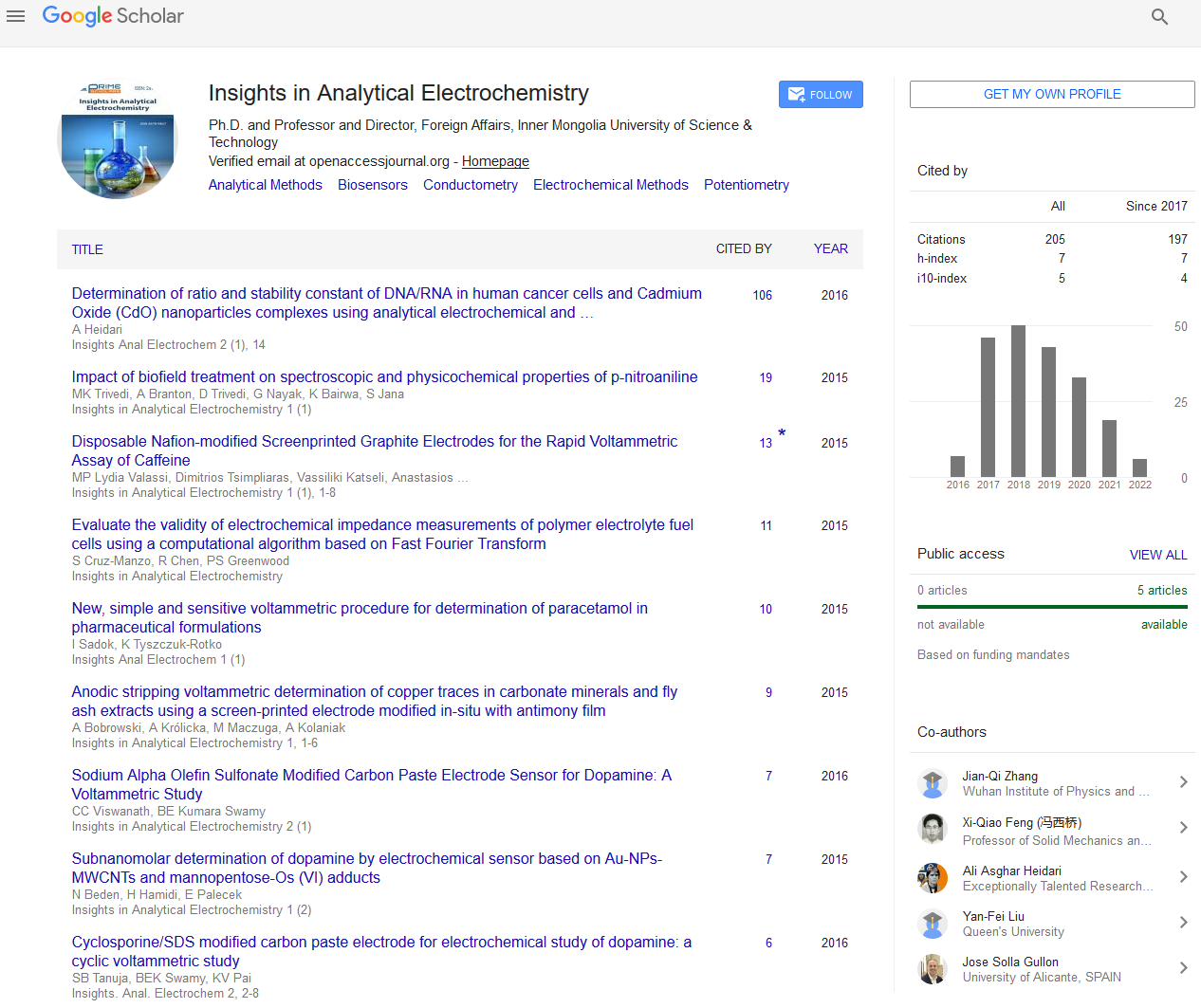Commentary - (2024) Volume 10, Issue 2
Electrochemistry: Harnessing the Power of Electron Transfer for a Sustainable Future
John Lone*
Department of Chemistry-Angstrom, Uppsala University, Sweden
*Correspondence:
John Lone,
Department of Chemistry-Angstrom, Uppsala University,
Sweden,
Email:
Received: 29-May-2024, Manuscript No. IPAEI-24-20786;
Editor assigned: 31-May-2024, Pre QC No. IPAEI-24-20786 (PQ);
Reviewed: 14-Jun-2024, QC No. IPAEI-24-20786;
Revised: 19-Jun-2024, Manuscript No. IPAEI-24-20786 (R);
Published:
26-Jun-2024, DOI: 10.36648/2470-9867.24.10.11
Description
Electrochemistry explores the intersection of chemistry and
electricity, focusing on how chemical reactions produce or
consume electrical energy. At its core are oxidation-reduction
redox reactions, where electrons transfer between species.
These reactions occur at electrodes immersed in electrolytes,
facilitating ion movement. By applying a potential difference
voltage between electrodes, one undergoes oxidation
loses electrons while the other undergoes reduction gains
electrons, generating an electric current. Key concepts include
electrode potentials, measuring species’ tendency to gain or
lose electrons, critical for determining reaction feasibility.
Electrolysis exemplifies using electrical energy to drive nonspontaneous
reactions, like splitting water into hydrogen and
oxygen, pivotal in hydrogen production. Battery technology
epitomizes electrochemistry’s practicality, storing electrical
energy chemically. Batteries, comprising electrochemical cells
with electrodes and electrolytes, power electronics, electric
vehicles, and grid-scale storage. Understanding corrosion
mechanisms, where metals react with their environment,
enables developing protective coatings and inhibitors, crucial
across industries. Electrochemistry’s applications span
energy storage electroplating for corrosion resistance and
aesthetics, and sensors detecting analytes in healthcare and
environmental monitoring. Fuel cells exemplify clean energy
production via hydrogen and oxygen reacting electrochemically
to yield electricity and water. Future electrochemical research
focuses on advanced electrode materials, electrochemical CO2
reduction for carbon capture, and biomedical applications
merging electrochemistry with bio systems for diagnostics and
drug delivery. Electrochemistry underpins modern technology’s
core, from energy solutions to environmental sustainability
and healthcare diagnostics. Manipulating electron transfer
at microscopic and macroscopic levels continues driving
innovations, promising a sustainable and technologically
advanced future. Electrochemistry’s influence spans industries
from energy storage to environmental protection, continuously
evolving with technological advancements. Research in
advanced materials and processes aims to enhance efficiency
and sustainability, paving the way for cleaner energy solutions.
The integration of electrochemical principles with biology
holds promise for revolutionary biomedical applications,
such as biosensors and targeted drug delivery systems.
Electrochemistry is fundamental to understanding and
harnessing the interactions between electrical energy and
chemical reactions. It not only elucidates the mechanisms
behind processes like corrosion and battery operation but
also drives innovations in renewable energy technologies
and environmental remediation. One of the most significant
applications of electrochemistry lies in energy storage and
conversion. Batteries, the cornerstone of portable electronics
and electric vehicles, operate based on electrochemical
principles. They store and release energy through redox
reactions occurring between electrodes and electrolytes.
Advances in battery technology, such as lithium-ion batteries,
have revolutionized energy storage by providing high energy
density, longer lifespan, and faster charging capabilities.
These developments are crucial for reducing reliance on fossil
fuels and integrating renewable energy sources into the grid.
Moreover, electrochemical processes play a pivotal role in
sustainable energy solutions. Fuel cells, for instance, convert
chemical energy directly into electrical energy through the
electrochemical reaction of hydrogen and oxygen, with water
as the only by product.
Acknowledgement
None.
Conflict Of Interest
The author’s declared that they have no conflict of interest.
Citation: Lone J (2024) Electrochemistry: Harnessing the Power of Electron Transfer for a Sustainable Future. Insights Anal Electrochem. 10:11.
Copyright: © 2024 Lone J. This is an open-access article distributed under the terms of the Creative Commons Attribution License, which permits unrestricted use, distribution, and reproduction in any medium, provided the original author and source
are credited.

